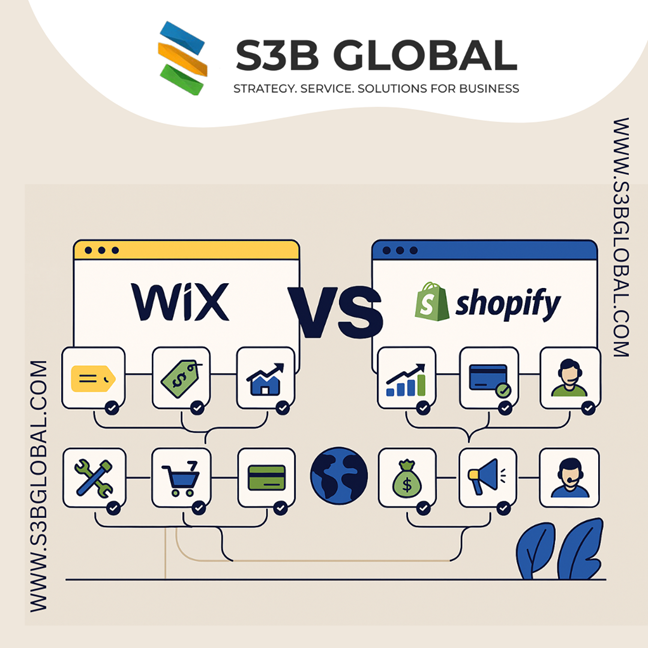
Choosing the right ecommerce platform is one of the most important decisions for any online seller. Shopify and Wix are two of the most popular options—but they serve different business needs. Below, S3B Global breaks down the differences, advantages, and trade-offs so you can choose the best home for your online store.
Quick verdict
-
Choose Shopify if you plan to scale, need advanced ecommerce tools, want best-in-class checkout & payment options, or expect heavy traffic and integrations.
-
Choose Wix if you’re a small business or creative seller who prioritizes design flexibility, lower starting costs, and an easy drag-and-drop builder for a simple store.
1) Pricing & total cost of ownership
-
Shopify: Plans start around the low-tier (often listed at $29/month for core plans) and scale up with features. Expect additional costs for apps, themes, and payment-processing if not using Shopify Payments. Transaction fees apply when using external payment gateways.
-
Wix: Has lower entry-level pricing and a broader range of non-commerce plans; ecommerce plans typically start lower than Shopify (e.g., $29–$39/month tiers for core/business plans), but adding apps and premium services can raise costs. Recent moves (like better payment integrations) make Wix more competitive.
Takeaway: Wix is cheaper to start; Shopify can be more expensive but justifies costs with deeper ecommerce features and scalability.
2) Ease of use & site building
-
Wix is a visual drag-and-drop builder with huge design freedom and many built-in templates — ideal for sellers who want control over pixel-perfect layouts without coding.
-
Shopify also provides a user-friendly interface and many themes, but its structure is more ecommerce-centric (collections, products, checkout flows) and is optimized for selling at scale.
Takeaway: Wix wins on pure design flexibility; Shopify wins on ecommerce workflows and store management.
3) Ecommerce features & scalability
-
Shopify is built for commerce: robust inventory management, abandoned-cart recovery, advanced discounting, multi-channel selling (Amazon, Instagram, Facebook), POS integrations, and a massive app ecosystem. This makes it far more scalable for growing businesses.
-
Wix covers the essentials—product pages, coupons, basic inventory, and some multichannel options—but its feature set and third-party integrations are not as extensive as Shopify’s, which limits scalability for complex stores.
Takeaway: For growth, larger catalogs, or complex needs (subscriptions, marketplaces, advanced shipping), Shopify is the stronger platform.
4) Apps, integrations & ecosystem
-
Shopify App Store is vast (thousands of ecommerce-specific apps) — which is a double-edged sword: you can add almost any functionality, but costs can add up.
-
Wix has a growing App Market focused on site features and marketing; excellent for single-owner stores that need a few add-ons but not enterprise integrations.
Takeaway: If you need specialized ecommerce plugins and third-party integrations, Shopify offers more choices.
5) Payments & fees
-
Shopify: Works best with Shopify Payments (lower fees); using third-party gateways incurs transaction fees on many plans. Payment processing rates depend on region and plan.
-
Wix: Uses Wix Payments and is increasingly integrating major PSPs (recent deeper PayPal integration is an example), improving checkout flexibility and reporting. Fees vary by provider and market.
Takeaway: Compare your expected processing volume and local PSP fees — at scale, Shopify Payments can be more cost-efficient; for small sellers, Wix’s easier integrations may be sufficient.
6) SEO & marketing
-
Shopify: Strong SEO foundations (customizable title/meta, structured data, sitemap management) and excellent multichannel selling & analytics tools. Third-party SEO apps can fill any gaps.
-
Wix: Has considerably improved its SEO capabilities in recent years and offers accessible SEO tools and guides — great for beginners. For highly technical SEO or complex structured data needs, Shopify + apps typically performs better.
Takeaway: Both platforms can rank well when configured properly; Shopify gives more advanced controls for aggressive SEO strategies.
7) Design & mobile experience
-
Wix: Superior visual control and template variety; excellent for brand-forward stores and creatives.
-
Shopify: Mobile-optimized themes focused on conversion, checkout speed, and UX — especially helpful for conversion-driven stores.
8) Support & community
-
Shopify: 24/7 support, large developer community, dedicated agencies, and an extensive knowledge base.
-
Wix: Strong support and documentation geared toward site building and small business owners.
Who each platform is best for
-
Shopify is best for: merchants who want to scale, need reliable checkout & inventory, sell across channels, run high volumes, need third-party integrations, or plan to grow into enterprise features.
-
Wix is best for: creative sellers, small boutiques, service providers, or first-time store owners who want low friction, strong visual design, and an affordable starting point.
Real-world decision checklist (pick the platform that matches most answers)
-
Do you expect to scale quickly or sell on multiple marketplaces? → Shopify.
-
Is a beautiful, brand-focused design your #1 priority and you’ll keep catalog small? → Wix.
-
Do you need enterprise-grade payment, shipping and POS features? → Shopify.
-
Is budget tight and you want to test products with a low-cost site? → Wix.
Final recommendation from S3B Global
If your priority is pure ecommerce growth, reliability, and a platform that grows with your business, Shopify is the safer long-term bet. If you’re launching a low-volume, design-led shop, or want to get online quickly with minimal setup costs, Wix is an excellent choice.
If you’d like, S3B Global can:
-
Audit your product catalog, projected order volume and budget, then recommend the optimal plan + cost estimate.
-
Provide a migration plan from Wix → Shopify (if you start small and plan to scale).
Ready to scale your online presence? Contact s3bglobal for a free site audit and a roadmap showing how WordPress can grow your business.
Email: info@s3bglobal.com
To know our Company . S3B Global
